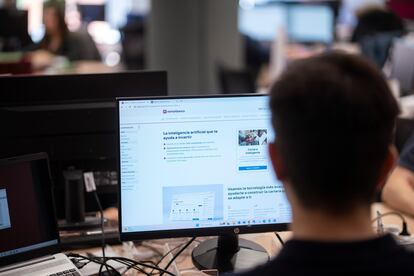When the machines tell you where to invest: ‘You won’t always win’
Artificial intelligence is making headway in financial markets as a tool for recommending funds or quickly analyzing millions of data points

It is eleven o’clock in the morning at the Madrid headquarters of the Renta 4 bank and a group of eight young people from various countries are typing away concentrated in front of their screens. Some are industrial or aeronautical engineers, others mathematicians or have a master’s degree in artificial intelligence. They are the team chosen by the bank to create new AI (artificial intelligence) tools, the technology that seems set to revolutionize everything. Investment, too. “With four clicks, clients have access to a series of analyses with millions of calculations behind them, and it gives them the best fund options,” explained Celso Otero, who leads the team.
A test on their website allows you to check how these intelligent digital advisors work: you choose a sector among finance, technology, energy or water; you enter the amount to invest with a minimum of 5,000 euros; and the most recommended funds appear in order according to profitability, risk, or a mixture of both. You can accept the suggestion or not, but the artificial intelligence, without the need for human intervention, has already done its job: to show the options with the highest probability of success.
The tool is just one of the many available. You can also have a mixture of artificial intelligence and bank advisors build your portfolio, after responding to a series of questions so that it is as individualized as possible. Otero says that it is a matter of statistics: the more information, the better. “Is that a guarantee that you’re going to have a positive profit or better results than everyone else? It’s not. It’s like when you take a test. If you study everything you have more possibilities of getting a good grade. Does that guarantee that you’ll have a 10? No. AI is one more tool. You won’t always win,” he explained.
Technology tends to jump rapidly into the world of finances, because it can make all the difference in a sector that moves staggering quantities of money at high speeds. The financial news outlet Bloomberg, whose terminal has 325,000 subscribers who pay $25,000 a year, has announced the development of BloombergGPT. The enormous quantity of data involved has encouraged the American company to make the leap to generative artificial intelligence. The new model includes sentiment analysis, news classification and question-answering functions. It will be able to comb thousands of news items about companies and evaluate whether they are pessimistic or optimistic for investors, and even write headlines based on brief articles.
If it’s possible to create applications that tell you where to invest your money, are financial advisors’ jobs at risk? Otero isn’t sure. “Think about the Industrial Revolution or when tractors reached the countryside. There have never been so many people living in the world, and there have never been so many people working as today, and we’re in the most evolved world in history. The advisor can do other things that add more value. We aren’t seeing a substitution. If you take the bureaucratic work away from an advisor, and instead of having to read 55 newspapers you have it all summarized, you can be much closer to the client,” he said.
The Arcano investment bank does not share that vision. “Artificial intelligence won’t affect whoever cuts your meat at the butcher’s or brings your Amazon package, but in asset management it will have a significant impact. Part of our job is to filter information to make investment decisions, and if a system does that it doesn’t need so many people,” said Francisco Navas, Investment Director of Venture Capital at Arcano Partners. To make his point land, he offered up a bitter reminder to journalists: ChatGPT can write news stories.
The professional trader Francisca Serrano pointed out some advantages of machines investing on our behalf: “Human beings, by nature, are subject to cognitive and emotional biases that can affect their capacity to make rational and objective decisions. Automatic algorithms, however, are designed to operate objectively, based on data, which eliminates emotional interference.”
But unexpected events, as Otero from Renta 4 explained, can work against the machines: “There are market movements that don’t depend on concrete patterns but have a randomness that can’t be predicted. Anyone who says they can predict the short term, in my opinion, is lying.”
No model can anticipate a sudden declaration of war or the beginning of a pandemic, but it can identify trends, comparing millions of data points at a velocity impossible for human beings. That can open up a divide between those who have access to such applications and those who don’t, as trader Jordi Martí explained. “AI will give professionals more powerful and efficient tools to trick and manipulate, and we will have to keep copying their movements. Nothing will change. The market is still ruled by emotions: euphoria, panic and fear. They will make money, the great majority of small-scale traders will lose it and a small number of people will keep copying the professionals,” he predicts.
All things indicate that there will be more sophistication, but algorithms have played a role in the financial industry for decades. Early experiments included some notable disasters, such as the high-risk fund Long-Term Capital, whose board included two Nobel Prize winners. It ended up being bailed out in 1998.
Markets also move without human participation in so-called high-frequency trading. Algorithms create thousands of buying and selling orders in fractions of a second, in order to take advantage of small price changes and glean higher profits. These transactions tend to take place from powerful computers situated close to business centers. Being a few kilometers away could mean being later and, therefore, earning less or losing.
The Flash Crash, one of Wall Street’s worse memories
The risks are there. One of Wall Street’s worst memories was caused by automated systems: on May 6, 2010, Navinder Singh Sarao provoked the so-called Flash Crash, an accelerated plunge in stock markets, using his knowledge about the reactions of high-frequency machines. He used his home PC to trick them with an algorithm that simulated creating sale orders, which pushed the rest to sell en masse. He was detained in 2015 and sentenced to a year of house arrest in January 2020.
AI’s irruption into the investment world has provoked plenty of questions. “Who is responsible if an automatic algorithm does something that results in significant losses, the developers of the algorithm, the operators of it or the financial institutions that use it?” Francisca Serrano asks.
Martí does not believe that the overarching dynamics will change. “If professional money wants to buy cheap, it will generate or take advantage of panic situations, just like 100 years ago. And if they want to sell high, they will generate or take advantage of situations of euphoria, just like 100 years ago.”
Sign up for our weekly newsletter to get more English-language news coverage from EL PAÍS USA Edition
Tu suscripción se está usando en otro dispositivo
¿Quieres añadir otro usuario a tu suscripción?
Si continúas leyendo en este dispositivo, no se podrá leer en el otro.
FlechaTu suscripción se está usando en otro dispositivo y solo puedes acceder a EL PAÍS desde un dispositivo a la vez.
Si quieres compartir tu cuenta, cambia tu suscripción a la modalidad Premium, así podrás añadir otro usuario. Cada uno accederá con su propia cuenta de email, lo que os permitirá personalizar vuestra experiencia en EL PAÍS.
¿Tienes una suscripción de empresa? Accede aquí para contratar más cuentas.
En el caso de no saber quién está usando tu cuenta, te recomendamos cambiar tu contraseña aquí.
Si decides continuar compartiendo tu cuenta, este mensaje se mostrará en tu dispositivo y en el de la otra persona que está usando tu cuenta de forma indefinida, afectando a tu experiencia de lectura. Puedes consultar aquí los términos y condiciones de la suscripción digital.









































